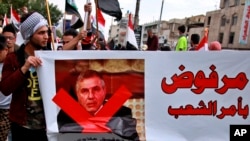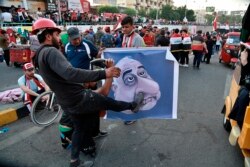Months of political crisis in Iraq appeared to take a new leap into the unknown Tuesday, after caretaker Prime Minister Adel Abdul Mehdi's interim mandate expired, in accordance with the country's 2005 post-Saddam Hussein constitution. Mohammed Tawfiq Allawi, who had been chosen to succeed Abdul Mehdi, withdrew Sunday, saying he was unable to form a new government, triggering a political void.
Iraqi state TV displayed a statement by Abdul Mehdi saying he was "stepping aside," leaving either a deputy prime minister or a member of his caretaker government to preside over weekly Cabinet meetings. A photo on Twitter showed Iraq's oil minister, Thamir Ghadhban, presiding over Tuesday's session.
Iraq's Kurdish president, Barham Salih, who has 15 days to appoint a new prime minister according to the constitution, is supposed to fill the position himself during the interim (as per Article 81 of the constitution). Several Shi'ite political parties, however, have expressed opposition to that formula. The Iraqi Hezbollah group's spokesman, Abou Ali Askeri, warned against "naming any prime minister that is an ally of the U.S.," saying it would "put Hezbollah in an open conflict with him."
Several of the potential new prime minister-designates, including the head of Iraqi intelligence, Mustapha Kazemi, appeared to anger hardline Shi'ite factions close to Iran. Other possible choices mentioned by Iraqi media included former Basra Governor Asaad Aydani, former Tourism Minister Qahtan Jabbouri, Education Minister Qusay Souheil, and former employment minister Mohammed Shiyah. Aydani and Shiyah reportedly have been rejected by leaders of the current protest movement.
Iraqi analyst Ali Tamimi told Saudi-owned Al Arabiya TV that "talk about the constitution handing interim power to the president is one thing, while the political reality on the ground is something totally different."
Adding to the uncertainty of the current political void, Abdul Mehdi announced new parliamentary elections for Dec. 4, saying the current body would be dissolved 60 days prior to the vote. It was not clear, however, if Abdul Mehdi's position as outgoing caretaker prime minister gave him the authority to make such a decision.
MP Ali Sahlani told Iraqi TV that "Iraq's extraordinary political crisis needs a solution that can be finessed in order to meet the approval of all of Iraq's political components." Key political leaders and parties reportedly were angered by the cavalier manner in which unsuccessful Prime Minister-designate Mohammed Tawfiq Allawi went about trying to compose his tentative Cabinet.
Khattar Abou Diab, who teaches political science at the University of Paris, told VOA that Iraq "appears to be reaching the end of a political era, in which the post-2003 political system has now become unraveled." Abou Diab said, nevertheless, Iraq's three top leaders, Adel Abdul Mehdi, Barham Salih, and (Parliament speaker) Mohammed Halbousi, "will cobble together some sort of interim solution to keep the situation as stable as possible."
Abou Diab adds that the killing of Iran's top regional commander, Qassem Soleimani, in January "left (Tehran's) forces in disarray," and that those who have replaced him "have been struggling to regain control of the political situation."
Popular protests, which began in October in many cities across Iraq, prompted Abdul Mehdi to resign in November, adding to political turbulence. The killing and wounding of dozens of protesters sparked public outrage, and caused Iraq's top Shi'ite leader, Grand Ayatollah Ali Sistani, to demand that a new government be appointed to respond to popular demands for better public services and an end to systemic corruption.
Iraq's U.N. special envoy, Jeanine Hennis-Plasschaert, told the U.N. Security Council Tuesday that "Iraq must protect demonstrators and prosecute those who have hurt them." She also called on the country's political parties to "restore the public's confidence in the system," adding, "Armed groups outside the scope of the state should be disarmed."
Paul Sullivan, a professor at the U.S. National Defense University, told VOA, "Iraq's chaos needs a solution," and the country's people deserve "peace, security and prosperity." At the same time, however, he said he thinks that given "the divisive nature of the country, it will be difficult to find long-term leadership to make the tough decisions needed to move the country forward."






